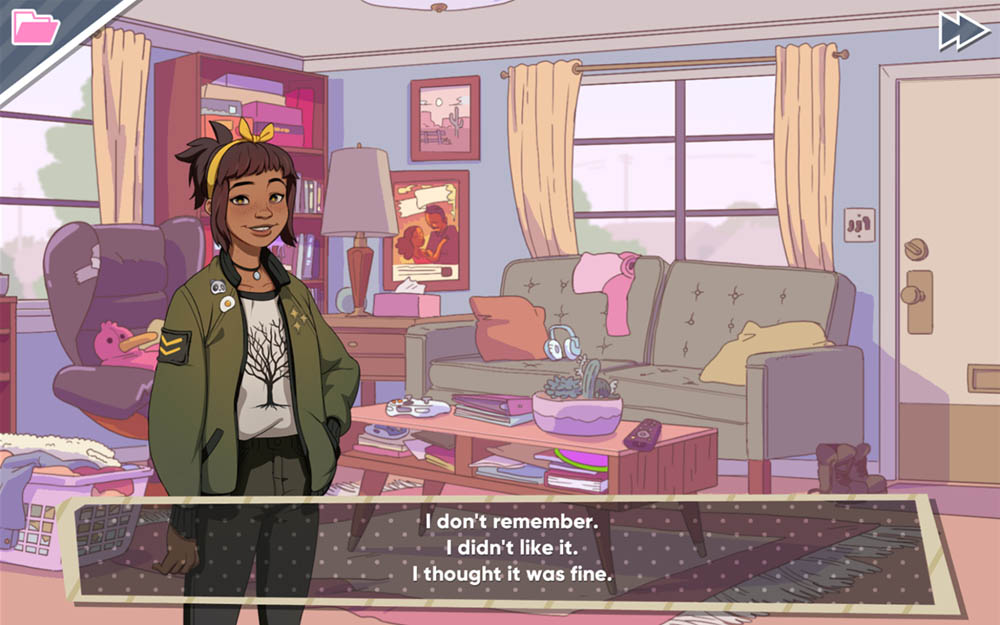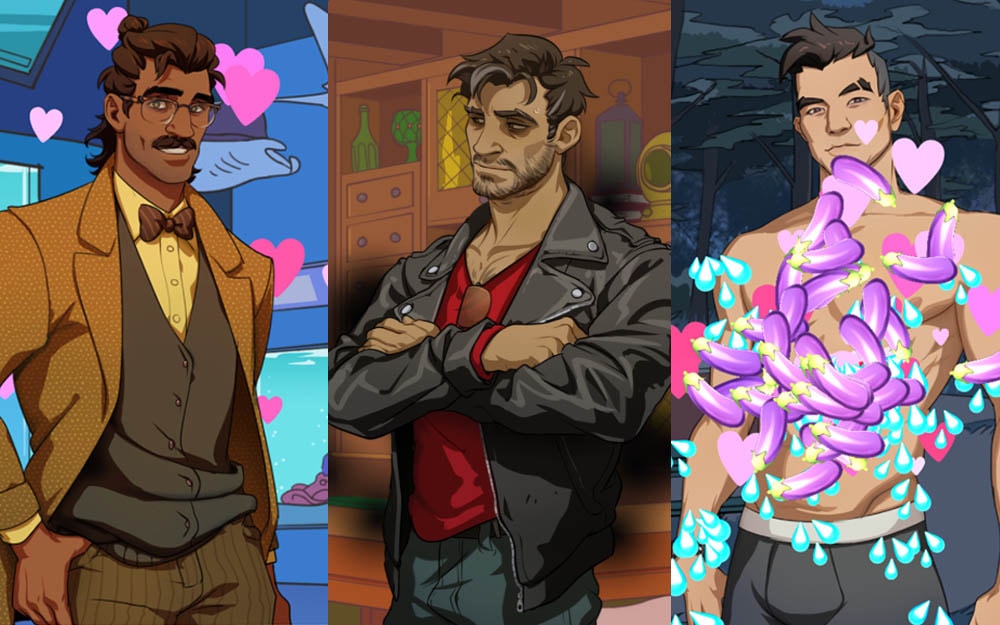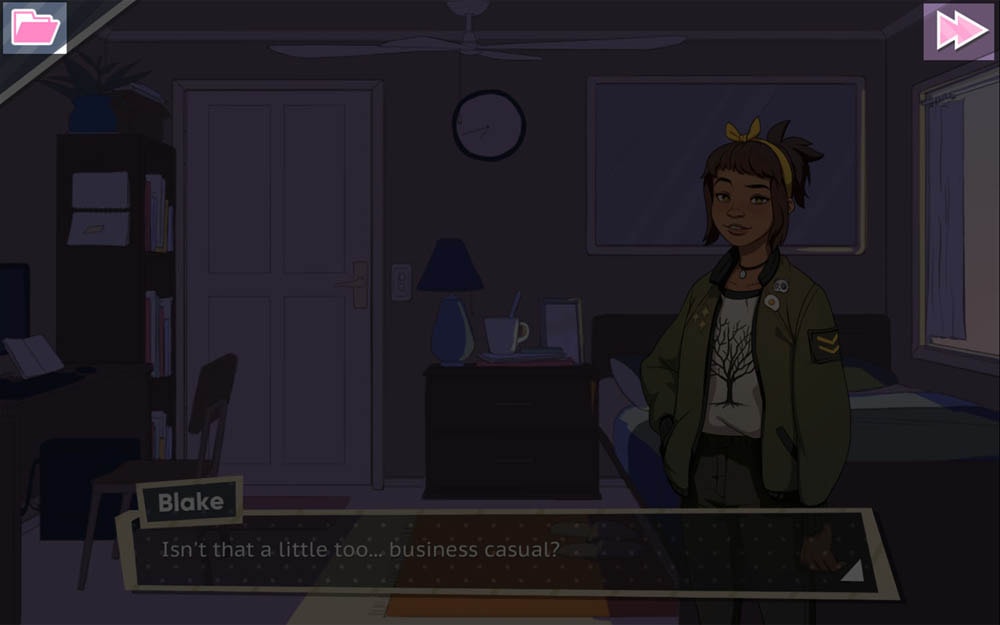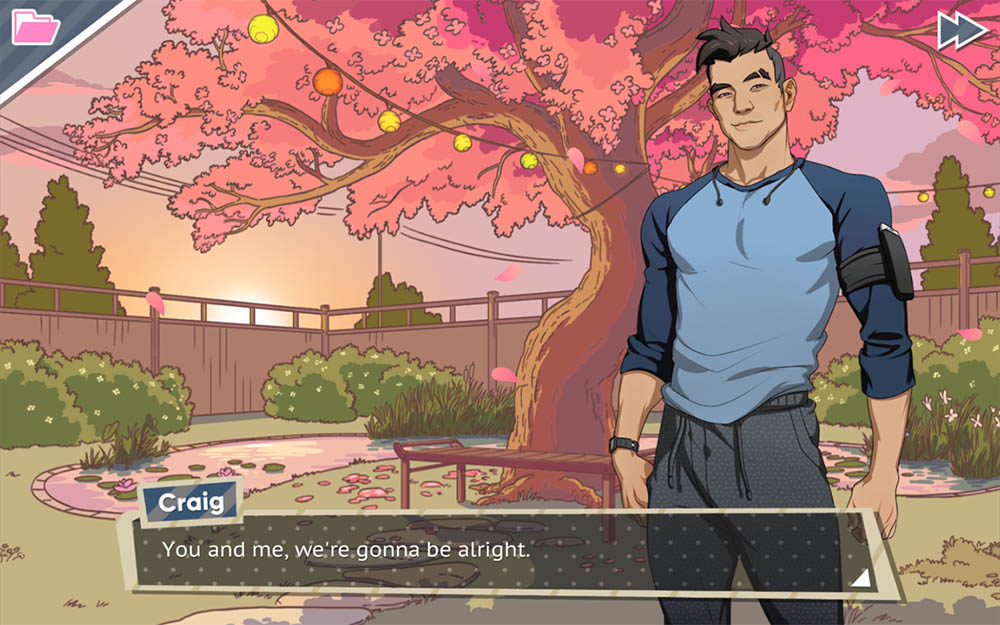Game Forum: Dream Daddy design review
November 26th, 2017
Should I look at Craig's butt or not? Do I ask Damien about the bug collection displayed in his gothic library? What happens if I order a fruity cocktail while hanging at the bar with burley Robert? These are the kinds of decisions you have to make in Dream Daddy, a gay daddy dating simulator.
Much like 4Chan's Katawa Shoujo (literally: Cripple Girls), Dream Daddy has all of the ingredients to be a straight-up parody: an underrepresented audience, often difficult themes, and the visual novel format. But thankfully, much like Katawa Shoujo, Dream Daddy delivers a sweet story that explores the chosen themes in a sincere way.
The gameplay of Dream Daddy is simple and this feels like a deliberate choice. Tying the game together is the narrative of a single father and his daughter who have moved to a new neighbourhood, which just so happens to be populated by an improbable number of eligible single dads.
Before its time to get into any of that narrative though, the first thing the player does is create their Dadsona - the character they will play with during the game. This is an important first step toward helping the player really immerse themselves in the character they will create, as well as the wider story.
It perhaps shouldn't be surprising that in a game that is keen to promote diversity and representation, the player is able to choose from a wide palette of skin tones, as well as various body types. You can also choose whether your character should wear a binder, implying that they are transgender. These choices have no impact on the wider game - you never see your character undressed and characters don't react differently to you - but this helps build that sense of inclusion in the story.

Once the main game gets going, the player can begin exploring their new neighbourhood. Here the narrative arc is introduced as well as the main gameplay mechanics - responding to multiple dialog options that are presented to you. In the context of the narrative wrapper, this involves making choices as to how to respond to different situations - such as how to handle it when your daughter is upset over a fight with her friends - or about what to do next.
On the whole these choices feel pretty shallow. Though responding to the other dads is a nice way to create a backstory for your character - such as whether your character is gay or bi, whether your daughter is adopted or biological - it never feels like this makes any impact to the story as a whole.
There are no extraneous systems in the game outside of these choices either - this isn't a dating simulator that uses an economy system - and initiating a date is as simple as logging onto Dadbook. By stripping out possible complexity, the game feels leaner and more accessible, and it helps the narrative shine.
However, this deliberate simplicity means that when presented with multiple branches of the story to explore - should we unpack, go to the coffee shop, or go to the mall - it is often the case that the only real choice is in which order these events will play out.
And it's easy to understand why the developers chose to do this as it allows the player to explore all of the content available. This comes at the expense of making these choices feel redundant. In most cases, I'd rather the game choose where I'm going next, rather than create the illusion of choice.

Of course the overarching narrative is not the selling point of the game. Instead, it forms a wrapper around the dates, and helps build to the eventual finale. And just because the choices in these segments don't have an impact on the narrative, it doesn't detract from what is an otherwise satisfying arc.
The way you respond to dates however does have an impact on the outcome and feels more gamey than the rest of Dream Daddy. The core loop for dates are straightforward too - you send a message to one of the seven dads from the neighbourhood, go on a date where you have the opportunity to respond to dialog and events, and eventually receive a rating telling you how well you've done on your quest to woo the dad.
Just like in real life, dates can go well and can also go badly depending on your choices. The game has a fun way of feeding back on these choices too. If a dad likes your response, he will flutter with tiny hearts. If he doesn't like it, he will be surrounded by black spores. And if he loves it? Eggplants and water droplets emojis (which I think is a metaphor!)

While these choices - unlike the wider narrative choices - do feel more meaningful, it is often very easy to identify which options will elicit which response. Brooding Robert who hangs in bars prefers whiskey to fruity cocktails, teacher Hugo likes intellectual conversation over Long Haul Paranormal Ice Road Ghost Truckers (a reality show from the fiction of the game). While on the one hand it would be nice if there was some challenge in picking the perfect response - because, let's face it, dating is hard - ultimately it feels as though the game wants you to succeed with the dad of your choice.
In case you do make the wrong decision, the game's autosave feature also helps undo any errors. There's also a handy fast-forward function that skips ahead to dialog choices so if your save file is quite a way back, you can quickly get back to where you were. This was especially useful on a particularly difficult date where you need to find a missing item within a time limit, or else the date is failed. These features not only respected my time, they also meant that I could reach the resolution I wanted through trial and error. This is also helpful if you want to see how your future could turn out with all of the seven dads.

One welcome addition to the dates are occasional mini games. These include a mini-golf game, a nightclub variant of Crossy Road and Dad-Brag Pokemon where you try and one-up a dad by gushing about your daughter's achievements. These games, while simple, help break up the text heavy main content of the game, and provide some variety that I wasn't expecting going into Dream Daddy.
You can take all of the dads out for two dates, but going for a third date commits you to that dad and begins the endgame. While your choices during dates will determine how much a dad has grown to like you, that does not always equate a happy ending. Certain dads will not deliver cliche happy ends which creates more natural interaction, even if you'd hoped to run off into the sunset together.

Final Words
Dream Daddy is a charming game that delivers a sincere story about dating other dads in a visually gorgeous art style, and with interesting and often hilarious dialogs. The gameplay is deliberately simple and, while it would have been nice to feel like your choices had some impact on the wider world the game inhabits, there is enough content to make the whole experience an enjoyable one.
About the Studio Gobo Game Forum
Each week a member of the design team at Studio Gobo presents a review of a game of our choice. This gives us the chance to think critically about the games we play and get better at discussing them with others. When it's my turn to present a review, I will also share a blog post covering the key points.

